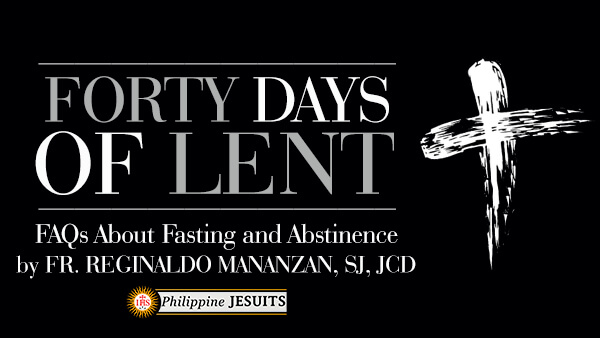


Fr. Reginaldo M. Mananzan, SJ
February 9, 2016
1.) According to canon law, what is required of Catholics this Lent?
The days of Lent are precisely from Ash Wednesday to midday of Holy Saturday. The Roman Catholic Church’s teaching on Lent is explicitly mentioned in Canon 1250 of the 1983 Code. And the context of this is the simple directive that the season of Lent contains the days and times of penance for the universal Church.
Penance is an act of mortification, that is, any human pain observed or experienced as a sign that one remembers and wishes to participate in the sufferings that our Lord Jesus Christ went through for the forgiveness of our sins and our salvation.
The canonical forms of penance during Lent are precisely: fasting and abstinence.
2.) What exactly does fasting mean? Who are required to fast? What are we allowed and not allowed to do?
Fasting is one of those two means of Lenten penances which canon law obliges (the other being abstinence). In canon 1251, fasting is to be observed on Ash Wednesday and Good Friday. In canon 1252, fasting binds those who have attained their majority. What does this mean? It means that this law applies to you from midnight of your eighteenth birthday until the beginning of your sixtieth year, that is, until midnight of your fifty-ninth birthday.
The law of fasting prescribes that only one full meal a day is taken. Two lighter meals are permitted to maintain strength according to each one’s needs. Eating between meals is not permitted, but liquids, including milk and fruit juices, are allowed.
3.) What if I can’t fast? What reasons can exempt me from fasting?
It is basic in any human law that one cannot oblige anyone to observe something which is not possible or even inhuman to follow. The two forms of penances, fasting and abstinence, are more realistically applied to the moneyed, able, powerful, and privileged. Consequently, the materially poor like our fellow Filipinos living in shanties or under the bridges, the very sick like those who are bedridden and immobile, the maids and houseboys and other laborers who have to work more than nine hours a day, employees whose jobs require them to be attentive like policemen and security guards, doctors and nurses on duty, and the like, must be exempted. Jesus is not certainly a sadist to require these kind of persons to be mortified more than what they already undergo in most of their everyday lives.
4.) What can I do instead of fasting?
Offer your pains (and the work that you do that makes it unwise for you to fast) in exchange for the canonical Church requirement to fast on Ash Wednesday and Good Friday.
5.) What exactly does abstinence mean? Who are required to abstain? What are we allowed and not allowed to eat?
Abstinence is the other form of penance which canon law requires during Lent (canons 1251 and 1252). Aside from observing it on Ash Wednesday and Good Friday, abstinence is to be observed on all Fridays – unless a Solemnity should fall on a Friday.
The law of abstinence forbids the eating of meat, but eggs, milk products, and condiments made from meat may be eaten. Fish and all cold blooded animals may be eaten, for example, frogs, clams, turtles, etc. The law of abstinence binds those who have completed their fourteenth year and older. One is not bound on the fourteenth birthday, but begins to abstain at midnight at the close of the birthday.
6.) What if I can’t abstain? What reasons can exempt me from abstinence? What can I do instead?
The same principles for exemptions apply as in numbers 3 and 4 above. Nevertheless, the Catholic Bishops’ Conference of the Philippines teaches the following: Except on Good Friday and Ash Wednesday, abstinence may be substituted with exercises of piety, such as reading the Bible, going to Mass, visiting the Blessed Sacrament, praying the Holy Rosary, or with acts of charity, such as visiting the sick and prisoners, giving alms to the poor, or teaching catechism.
7.) Is this it? This is all I’m required to do as a Catholic this Lent?
Yes. But in the end, life and love are not just about “what you are required to do.” Jesuits always try to live out the ideal of the magis, the more. This is not just about “bigger and better,” or greater in number or size. The more here pertains to what will help us to come closer to God. So what magis can you do this Lent? What is the more that you can do to be able to come closer to God? And this question cannot be answered by canon law.
helenski on February 11, 2016 AT 11 am
i am so much enlightened.
Techie on April 14, 2017 AT 01 am
Thank you. This was very helpful
Pinoy Jesuits on April 14, 2017 AT 02 am
Thanks Techie, may you have a fruitful retreat. God bless!
Josephine on April 14, 2017 AT 11 am
Thank you so much!
Lamberto Ricardo on May 6, 2017 AT 08 pm
I wish that I could experience Jesuit retreat at your retreat house in Malaybalay Bukidnon.
Pinoy Jesuits on May 8, 2017 AT 12 am
Why not? You may contact them using the FB page: https://www.facebook.com/jesuitretreathouse.malaybalay 🙂
Connie on March 25, 2018 AT 09 am
Are those enduring the MRT torture daily exempt na from penance, Fr.
Comments are closed.